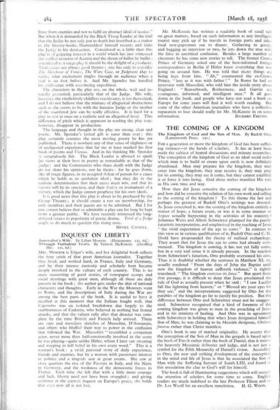THE COMING OF A KINGDOM
The Kingdom of God and the Son of Man. By Rudolf Otto. (Lutterworth Press. iss.) The Kingdom of God and the Son of Man. By Rudolf Otto. (Lutterworth Press. iss.)
FOR a generation or more the kingdom of God has been suffer- ing violence—at the hands of scholars. It has at least been made the subject of heated discussions and minute researches. The conception of the kingdom of God as an ideal social order which man is to build or create upon earth is now definitely abandoned. Men may prepare for the kingdom, they may enter into the kingdom, they may receive it, they may pray for its coming, they may see it come, but they cannot establish it or force it into being. God alone makes manifest His rule in His own time and way.
How then did Jesus conceive the coming of the kingdom and how did he conceive the relation of his own work and calling to the coming of the kingdom ? To this theme the last and perhaps the greatest of Rudolf Otto's writings was devoted. As Jesus conceived it, was the coming of the kingdom entirely a matter of hope, a future event, or was it in some manner or degree actually happening in the activities of his ministry ? Johannes Weiss and Albert Schweitzer plumped for the purely futuristic interpretation, and emphasised in the teaching of Jesus " the vivid expectation of the age to come." In contrast to this view or in serious qualification of it, Rudolf Otto and C. H. Dodd have propounded the theory of realised eschatology. They assert that for Jesus the age to come had already com- menced. The kingdom is coming, it has not yet fully come, but in a very real sense it is already present. In the reaction from Schweitzer's futurism, Otto probably overstated his case. Thus it is doubtful whether the sentence in Matthew XI, 12, usually rendered " From the days of John the Baptist until now the kingdom of heaven suffereth violence," is rightly translated, " The kingdom exercises its force." But apart from that passage, it is difficult to deny that Jesus proclaimed the rule of God as actually present when he said : " I saw Lucifer fall like lightning from heaven," or " Blessed are your eyes for they see," and the interpretations suggested by Otto for the parables of the kingdom go far to justify his position. But the difference between Otto and Schweitzer must notlbe exagger- ated. Schweitzer recognised that a kind of foretaste of the coming kingdom was given to men in the preaching of Jesus and in his ministry of healing. And Otto was in agreement with Schweitzer in holding that when Jesus designated himself Son of Man, he was claiming to be Messiah designate, Christ us futurus rather than Christ manifest.
Otto's book is one of marked originality. He asserts that the conception of the Son of Man in the gospels is based upon the book of Enoch rather than the book of Daniel, that it means the heavenly Messianic deliverer and judge, and is not just a symbol for the Fifth Monarchy of Daniel's vision. According to Otto, the new and striking development of the conception in the mind and life of Jesus is that he associated the Son of Man with the Suffering Servant of Isaiah LIII, and found In this association the clue to God's will for himself.
The book is full of illuminating suggestions which will occupy the attention of scholars for some time to come. English readers are much indebted to the late Professor Filson and to Dr. Lee Woolf for an excellent translation. H. G. Woon.














































 Previous page
Previous page